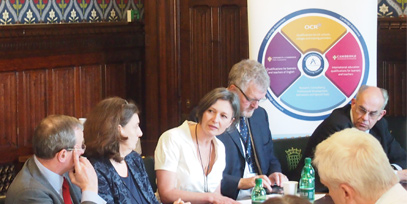25 April 2014

“Undue weight” is attached to exam results as a way of measuring schools and evaluating how good they are, Cambridge Assessment’s Group Chief Executive has said.
Simon Lebus told a parliamentary seminar that the sometimes unjustified importance given to exam results is why Cambridge Assessment has been working with the Open Public Services Network (OPSN) to develop a guide to help parents find and research good schools in England.
“There has generally been a lot of reflection on accountability and the damaging way in which that could impact the school and college system,” Mr Lebus said.
“I think there is potential for a much more multi-dimensional set of measures which are less easily distorted, give a better sense of how things are going at a school, and are generally much more user-friendly.”
The guide was launched in September last year and had 20,000 users on the first day alone. It uses publicly available results data from key stage exams and GCSEs as well as pupil and school characteristics from the national pupil database and Ofsted inspection reports.
There is potential for a much more multi-dimensional set of measures which are less easily distorted, give a better sense of how things are going at a school, and are generally much more user-friendly."
Simon Lebus
Importantly, it enables parents to judge a school in other areas rather than the standard 5 GCSEs at A* to C measure. Parents can see what the rates of uptake of different subjects at GCSE are, the number of A grades by subject, as well as where differences in performance are significant and consistent. In the future, other areas such as schools’ extra-curricular or sports provision could be compared.
The parliamentary seminar was chaired by Graham Stuart MP, Chairman of the Commons Education Select Committee, who said it was a “hugely important” area.
“Readily available data lies at the heart of open government,” he said. “The Coalition Government has been active when it comes to ensuring data is shared with the public, which is only appropriate given that there are better ways and quicker ways of sharing it than ever before”.
Those attending the debate included the chair of Ofsted, Baroness Morgan, the editor of the Good Schools Guide Lord Lucas and Shadow Education Minister Kevin Brennan. The National Governors’ Association and PTA-UK were also represented.
Roger Taylor, chair of the OPSN, a not-for-profit organisation, demonstrated how the guide currently works. He showed how parents that were interested in computing, for instance, could find a school that offered a GCSE in the subject and performed well overall.
“This obviously is just a start,” he added. “We do think there is a lot more that could be done to make education data more accessible to people and to help them use it to make decisions.”
Bringing the event on April 9 to a close, Mr Lebus said some “very compelling cases” had been made about how to take the guide forward, including a call for parents and governors to be closely involved. He said many of those who took part in the discussion would continue to be consulted in the months ahead.